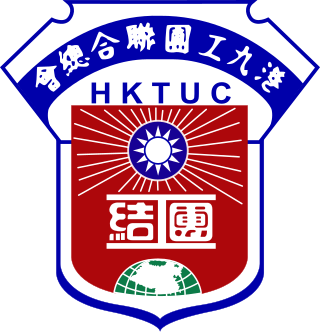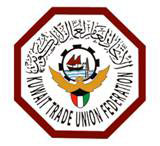Related Research Articles

The International Centre for Trade Union Rights (ICTUR) is "an organizing and campaigning body with the fundamental purpose of defending and improving the rights of trade unions and trade unionists throughout the world." ICTUR has accredited status with both the United Nations and the International Labour Organization.

The Confederation of Trade Unions of Armenia (CTUA) is a national trade union center of Armenia. It is led by Chairman Eduard Tumasyan.
The General Federation of Workers Trade Unions in Bahrain(Formerly known as the General Committee for Bahrain Workers) (GFWTUB) is a national trade union federation in Bahrain. It was established in 2002, by the Workers Trade Union Law granting workers the right to organize collectively.
The Workers Trade Union Law was passed by Hamad bin Isa Al Khalifa, King of Bahrain, on September 24, 2002.
The Confederation of Independent Trade Unions of Bosnia and Herzegovina is a trade union centre in Bosnia and Herzegovina. It was founded in 1905. ICTUR reports that "the SSSBiH is preoccupied primarily with the consequences of privatization and the high rate of unemployment and problems such as wage arrears."

The Hong Kong and Kowloon Trades Union Council is the third largest trade union federation in Hong Kong, after the Federation of Trade Unions (FTU) and pro-Beijing Federation of Hong Kong and Kowloon Labour Unions (FLU). It is affiliated with the International Trade Union Confederation.
TRANSNET, which stands for Transport, Service, and Networks, was a trade union in Germany and one of eight industrial affiliations of the German Confederation of Trade Unions.

The Kuwait Trade Union Federation is the sole national trade union center in Kuwait. It was founded in 1968 and is affiliated with the International Trade Union Confederation.
There are few trade unions in Oman, established following a 2006 Decree by the Sultan of Oman permitting their organization. Some of these, have done completed elections, they are members of the General Federation of Oman Trade Union (GFOTU). Oman has become the third Gulf Arab state, after Bahrain and Kuwait, to have a general federation of trade unions.
Qatar has been a member of the International Labour Organization since 1972, but has not ratified the Freedom of Association and Protection of the Right to Organise Convention, 1948, or the Right to Organise and Collective Bargaining Convention, 1949.
The National Trade Union Centre of Trinidad and Tobago (NATUC) is a trade union federation in Trinidad and Tobago. It was created in 1991 by the merger of the Trinidad and Tobago Labour Congress (TTLC) and the Council of Progressive Trade Unions (CPTU). It has a membership of 100,000.

The National Union of Government and Federated Workers (NUGFW) is a trade union in Trinidad and Tobago. It was formed on 3 June 1967 out of a merger between the National Union of Government Employees and the Federated Workers Trade Union. It is the largest union in the country.
The Vanuatu Council of Trade Unions (VCTU), in French Conseil des syndicats de Vanuatu, is the sole national trade union center in Vanuatu. It was founded in 1985 and all five unions in Vanuatu are affiliated to it. Membership has declined since 1994, when bitter strikes and conflict with the Maxime Carlot Korman government resulted in wholesale dismissals and new anti-strike legislation.
Trade unions in Afghanistan have a brief and turbulent history, beginning in 1967 and effectively ending with the Islamic state of the Mujahideen. There has been no reported trade union activity since the military intervention and removal of the Taliban regime.
Trade unions in Albania have had an unstable existence in recent decades, mirroring the regional political turbulence in Albania. Since the 1991 defeat of the Albanian Party of Labour (APL), independent trade unions have asserted themselves, with two main national trade union centres; the United Independent Albanian Trade Unions (BSPSh) and the Confederation of Trade Unions (KSSh).
Prior to Algerian independence in 1962, trade unions in Algeria were structured within regional organizations of French trade unions. After independence the General Union of Algerian Workers (UGTA) became the sole trade union center. The UGTA was linked with the Front de Libération nationale; however, in 1989, with constitutional changes and new laws the UGTA was distanced from the FLN and no longer retained the position of sole trade union center. Despite this, the UGTA continues to be, in practice, the only center - with few trade unions outside its affiliation.
Trade unions in Antigua and Barbuda have a significant presence in the workforce, representing approximately 75% of Antigua and Barbuda workers.
Trade unions in Benin operate in relative freedom, with approximately 75% of the formal sector being unionized. There are, however, concerns expressed by the International Labour Organization (ILO) and the International Trade Union Confederation (ITUC) about the discrepancies between the government's Labour Code and the labour practices outlined by ILO Conventions 87 and 98 - specifically the right of unions to form without government approval, the right of seafarers to organize or strike, and restrictions on strikes.
Trade unions in Botswana operate within a longstanding democratic system in which the government of Botswana has ratified the International Labour Organization's core conventions, including Conventions 87 and 98.
Trade unions in Belarus are legally independent under International Labour Organization (ILO) conventions since 1956. In the early twenty-first century, Belarusian trade unions were subject to harassment and intimidation from government authorities. New trade unions and local unions were created with help from the ProfSoyuz Online working group of the Coordination Council during the 2020 Belarusian protests starting in mid-September 2020.
References
- ICTUR; et al., eds. (2005). Trade Unions of the World (6th ed.). London, UK: John Harper Publishing. ISBN 0-9543811-5-7.